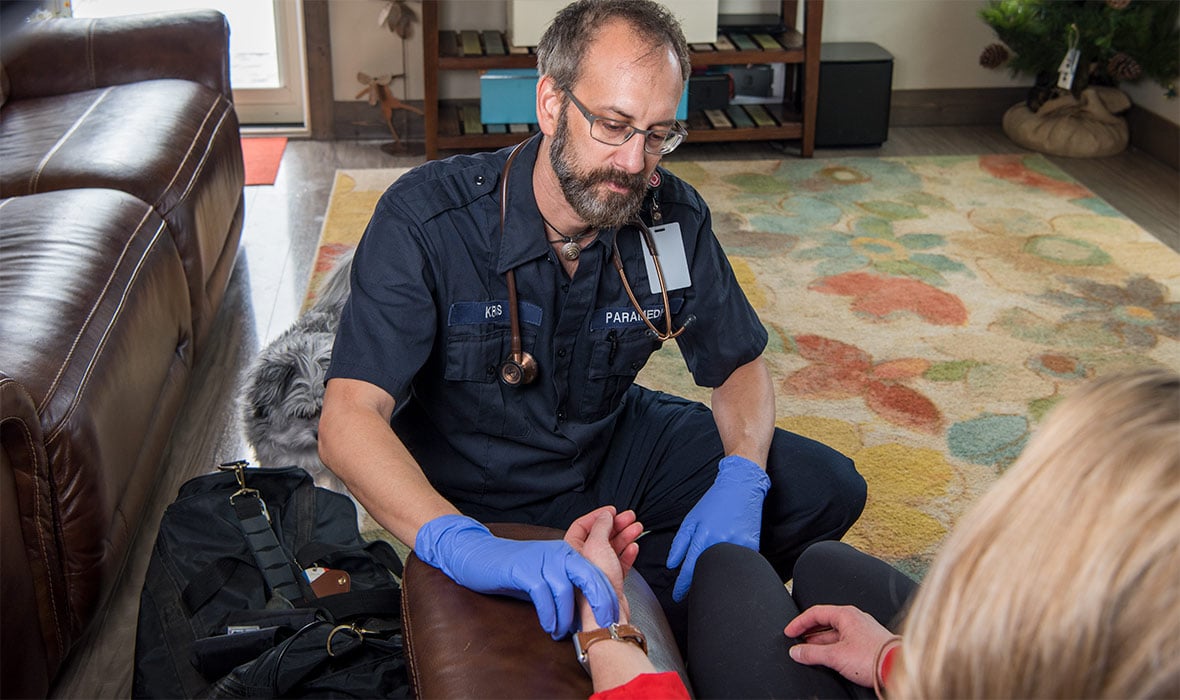Pulsara Around the World - February 2026
January Recap The start of 2026 was on the slow side for our events schedule, with our team heading to the Florida Fire & EMS Conference, the...

Editor's Note: Recently, the Journal of Emergency Medical Services interviewed Pulsara's Chief Marketing Officer Kris Kaull for his thoughts on the future of EMS and the need for improved communication in healthcare. Read the full article here.
—
 Kris Kaull, BS, NRP, FP-C has driven innovation and positive change in EMS for more than 26 years. After beginning his career as a firefighter and EMT, Kris started paramedic.com and co-founded EMS1.com.
Kris Kaull, BS, NRP, FP-C has driven innovation and positive change in EMS for more than 26 years. After beginning his career as a firefighter and EMT, Kris started paramedic.com and co-founded EMS1.com.
Currently the Chief Marketing Officer at Pulsara, a healthcare and EMS tech start-up, Kaull has also worked as a firefighter captain, paramedic and ambulance service director. Most recently, he practiced as a critical care flight paramedic covering Southwest rural Montana and Yellowstone National Park.
In this interview, Kaull shares his professional and personal perspective on how the COVID-19 pandemic is affecting EMS and healthcare, and how the industry can overcome the challenges it poses together.
JEMS: As a 26-year veteran in EMS, what challenges stand out to you with regard to EMS during the COVID-19 crisis?
Kaull: There is an enormous weight on the shoulders of EMS. As an industry, we are people pleasers and have spent our entire careers looking for ways to help people. While we understand “scene safety,” it’s much more difficult to stay safe when the enemy is invisible. Add to that “shelter in place,” kids home from school, possible loss of income, and the possibility of bringing the virus home with you; it’s a lot to carry.
We are short-staffed as our colleagues get sick. We have limited resources. And, the understanding of COVID-19 is dynamic.
My greatest concerns are: 1) Are we properly resourcing our EMS crews with equipment and knowledge? And 2) Are we providing our crews the mental wellness resources to stay healthy during this time? We expect a lot from frontline EMS personnel. It’s our responsibility to support them.
JEMS: You also are the Chief Marketing Officer at Pulsara. How has working for Pulsara during this situation been different from your role as an EMS leader in past disaster scenarios?
Kaull: EMS historically has been a doing job. Stop the bleed. Shock the patient. Start the IV. Respond. Treat. Transport. In the face of a crisis or multiple patient incident, our role has been that of doing more.
But with Pulsara, it’s about not doing more. It’s about assessing from a distance. Treating people in the most appropriate manner. And, possibly transporting to an alternative destination or ideally, not even transporting at all. That’s where Pulsara comes in.
At Pulsara, we’ve shifted our focus during the pandemic from strictly time sensitive emergencies to a more proactive approach in mitigating the demand on the healthcare system. Pulsara is flexible and scalable, so we’ve taken the technology and made the decision to pay it forward by providing our entire Pulsara software package for free to first responders, healthcare organizations, and public health to manage COVID-19 during this crisis.
That just feels like the right thing to do.
JEMS: What do you think are some of the main learnings for EMS agencies from the national pandemic?
Kaull: We are united. And, we are also learning that the nation is supporting us during this time. In a recent NY Times article, it was identified that paramedics face the greatest risk with the coronavirus. I’ve seen the largest EMS associations lobby for resources and financial support to take care of our EMTs and paramedics. And, I’ve seen the federal government acknowledge EMS as a critical player in mitigating and managing COVID-19. The ambulance industry isn’t going away. People will continue to be sick and injured. For the first time, our EMS industry has a single, unified voice.
JEMS: What role can technology play in a crisis like the one we are currently facing?
Kaull: Using mobile-first technology, first responders have access to real-time information, the ability to communicate, and resources that enable EMS to make timely decisions. There are many tools on the market today. As a specific example in the area of communications technology, Pulsara provides full case visibility, transparency and accountability to accelerate care, simplify complexity, enhance outcomes and improve financial performance.
Healthcare — as a whole — has always been reactive when it comes to technology. In the rest of our lives, we’re using FaceTime to connect with friends and family. We’re connecting via Snapchat, Instagram and group texts. We record videos and share them with each other.
But, when it comes to treating patients, we use outdated, archaic technology that is obsolete. I would never use a handheld radio, pager, fax or answering service in the rest of my life so why are we using these terrible tools during a time-critical emergency?
As humans, we are resistant to change. But during any crisis — especially a pandemic like COVID-19 — we’re seeing a lot of the red tape disappear. We’re seeing people adopt new practices because they have no other choice.
Continue reading the full article here.
For more of Kris's thoughts on the future of healthcare communication, check out this webinar: How EMS Leaders Are Using Mobile Technology to Manage the COVID-19 Crisis and Beyond.
![]()
Pulsara is helping with COVID-19 management by helping mitigate patient surge, streamlining patient transfers, minimizing exposure, and more. Learn more about COVID-19 + Pulsara here.

January Recap The start of 2026 was on the slow side for our events schedule, with our team heading to the Florida Fire & EMS Conference, the...

Recent research shows how Pulsara was successfully leveraged to connect more than 6,000 COVID-19 patients to monoclonal antibody infusion centers via...

At Pulsara, it's our privilege to help serve the people who serve people, and we're always excited to see what they're up to. From large-scale...